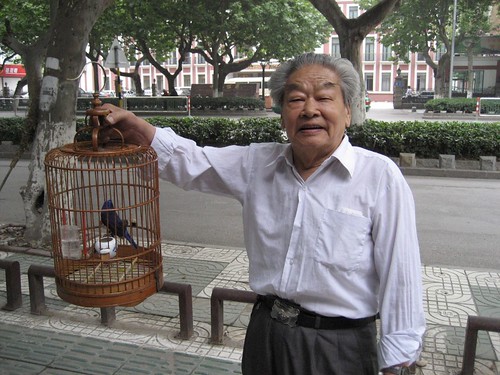
Man with bird in Nanjing
Or actually old folks out on the street. I knew that lots of old Chinese people kept birds, and that taking birds for a walk was a popular thing for old men to do early in the morning. But where is the scholarship on Chinese bird-keeping culture? Well, I found some, a study by Ho-hon Leung1Leung did a survey of Hong Kong bird keepers (all over 50, almost all male, most born on the mainland). Most of them lived with their children, who they claimed took good care of them, and most were married. So they are well taken care of, but seem to get little satisfaction out of home life.
This is where birds come in. They need to be raised and trained to sing, and there is a element of expertise here, so you can feel proud of your accomplishment. You can’t do that with dogs and cats, which in any case take up too much room. Plus, birds make it easy to meet people, especially other old men, since you all need to go out and walk your birds and of course talk to them and to the other birdmen. I suppose I could have guessed a lot of this, but I do find it interesting that birds are the chosen pet for this form of male bonding. I know at least in Meiji Japan dog-keeping was a very clear sign that one was a modernizer, and I wonder if anyone has seen anything the evolution of Chinese pet culture.
Ho-Hon Leung “The Lives of Elderly Bird-keepers: A Case Study of Hong Kong” in Chi, et al eds. Elderly Chinese in Pacific Rim Countries: Social Support and Integration. Hong Kong University Press 2001 There is a lot of interesting stuff in it, although it is more social science than a cultural studies approach ↩
Did you know that they “walk” the birds so that the birds will hear other birds sing and learn from it ? Birds raised alone don’t sing.
Yes, Leung talks about that. So having a bird forces you to go out and socialize, but not as much as having a dog would.